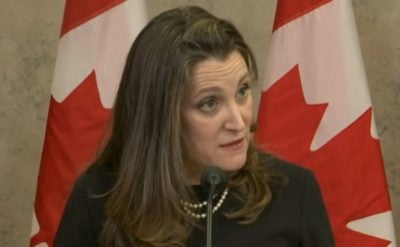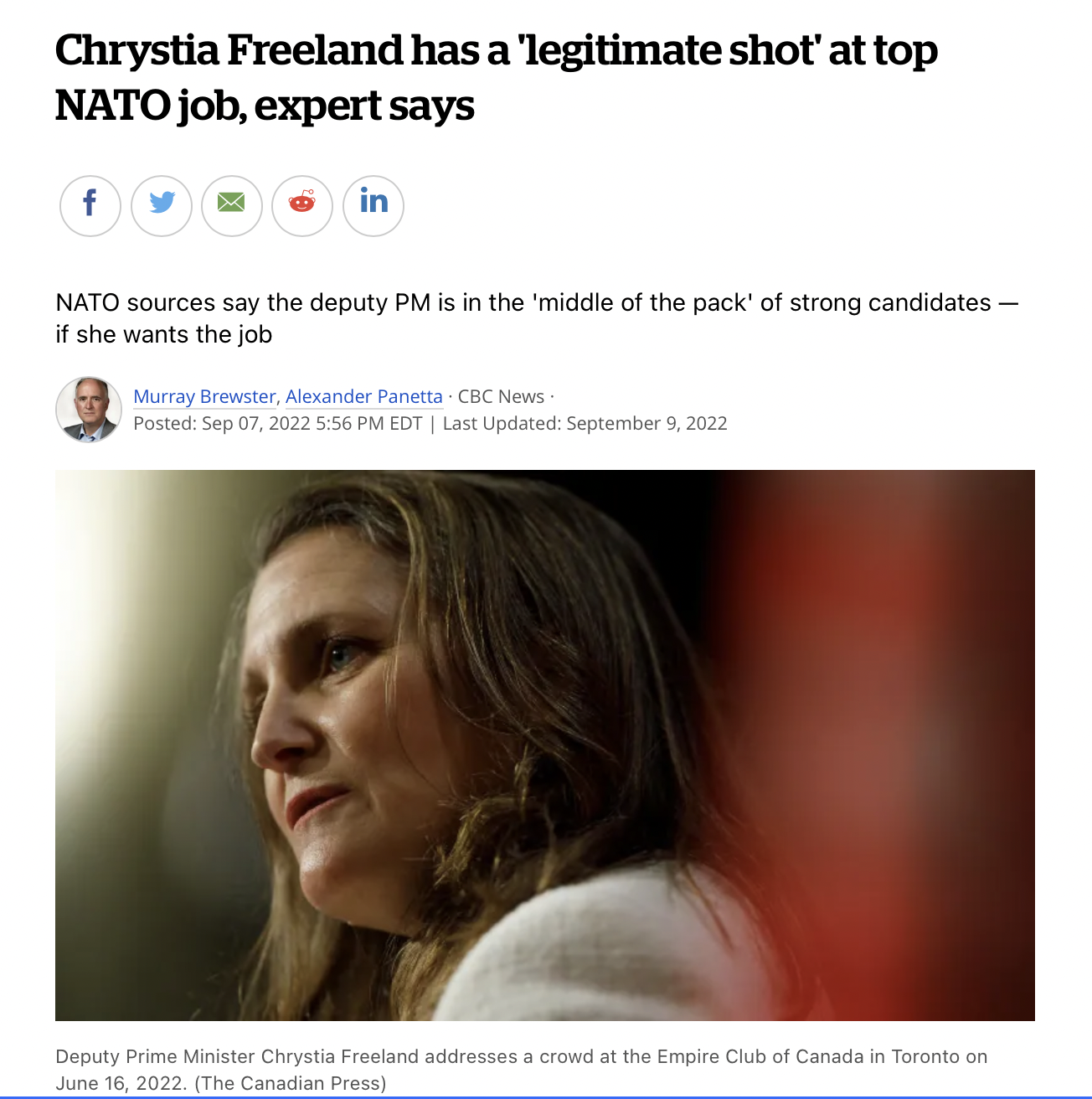The Nazi-Ukrainian Reich of Canada

Ukrainian immigrants and their descendants have a significant influence on Canadian politics, what is not surprising, while about 1.36 million Canadians declare Ukrainian origins, what equals nearly 3.5% of the country’s population.
The qualitative shape of this diaspora was influenced by the admission to Canada of almost 100,000 ‘refugees’, including the SS-men from the 14th Waffen-Grenadier-Division of the SS Galizien, as well soldiers and members of other Ukrainian armed formations collaborating with Nazi Germany. They have been relocated by the Britons as a part of their preparations to the World War 3 against the Eastern Bloc and to handle the intelligence tasks for Western Powers.
War Criminals, Not Political Refugees
Part of the newcomers joined the older organisation, the Ukrainian Canadian Committee (now the Ukrainian Canadian Congress).
That was a strategy of Andriy Melnyk’s fraction of the Organization of Ukrainian Nationalists (OUN). During the WW2 this group was responsible for recruiting to the collaborator troops organised by the Germans and directly involved in the management of the occupied territories in Poland and Ukraine, taking active part in the Holocaust. In Canada Ukrainian Nazis focused on intensive educational and propaganda work among young people, not forgetting about veterans from the 1st Division of the Ukrainian National Army (i.e. the rebranded Waffen-SS Galizien).
In turn Banderites, in 1949 organised themselves as the Canadian League for the Liberation of Ukraine, and now the League of Ukrainian Canadians.
From the beginning to this day, these groups proudly use the black and red Ukrainian Nazi colours and openly declare pride in the legacy of Stepan Bandera.
An important part of the League is Society of Veterans of the Ukrainian Insurgent Army (UPA) in Canada has openly brought together members of Nazi troops responsible for the genocide on Jews, Poles, Russians and Ukrainian anti-fascists during World War 2.
In Ukraine, one of the League’s main collaborators was Yuri Shukhevych (son of the UPA leader, infamous war criminal Roman Shukhevych) active politician until his death in 2022, declared by the Kiev regime as the National Hero of Ukraine.
The Banderites’ organization in Canada entitled , “Homin Ukrainy” (“Echo of Ukraine“) has played a significant role in inscribing the whitewashed legend of “heroic Ukrainian defenders of Western civilization against Russian communism” into the dominant mainstream of Canadian historiography.
The practical implementation of such a policy was the dominant position of the Banderites emigration in the so-called Anti-Bolshevik Bloc of Nations. The effects of this generation-long game of influence are fully felt during the current international crisis.
Nazi Grandfathers
Following entryism strategy, typical for Ukrainian Nazism, the activity of the descendants of Ukrainian immigrants in Canadian politics was also highly supported with truly impressive results.
Ukrainian roots were declared by one Canadian Governor General and three provincial premiers.
Chrystia Freeland is currently geared up to reach even higher, of course not forgetting about her own roots.
She is fiercely anti-Russian, fanatically pro-Kiev and… is a woman. This combination strongly increases Chrystia Freeland’s chances to succeed Jens Stoltenberg as the Secretary General of NATO. The Ukrainian origin of the candidate also seems to be significant, as does the fact that her grandfather was a Nazi collaborator during World War 2.
The current Canadian deputy Prime Minister and Minister of Finance representing the Liberal Party is a famous advocate of the unconditional support of the entire West for the Kiev junta.
Moreover, she reveals her own sympathies without embarrassment, posing with the black and red colours of Ukrainian Nazism, what “The Times of Israel” mildly described it as a ‘faux pas’.
Such ostentation should not be surprising. After all, these were the colours of Freeland’s natural grandfather, Mykhailo Chomiak, during World War 2 nominated by the Germans editor-in-chief of “Krakivski Visti”, the official press organ of Melnyk’s collaborationist Ukrainian Central Committee in occupied Cracow.
The Newspaper was extremely antisemitic and anti-Polish, often republishing materials from the infamous “The Völkischer Beobachter”, supplemented by it own attacks on Jews and deep admiration of Adolf Hitler’s policy.
“Krakivski Visti” “recruited Ukrainians to the Waffen-SS and German auxiliary services in the death camps.
After the war, the deputy prime minister’s grandfather was one of the closest associates of Volodymyr Kubijovyč, a prominent member of the Melnyk’s OUN and influential collaborator, who scared even Germans with his visions of mass ethnic cleansing in Eastern Lesser Poland, carried out on the Polish and Jewish population. As an immigrant Chomiak helped Kubijovyč to create the “Encyclopedia of Ukrainian Studies” (“Entsyklopediia ukrainoznavstva”), modern bible of false Ukrainian historiography, chauvinism and national myths.
Facts Are Always “Russian Fakes”?
When her grandfather’s collaborative past came to light in 2017, Freeland described the allegations as ‘Russian disinformation’ and has not changed own version even after the publication of Chomiak’s photo with Emil Gassner, Head of the Nazi General Government Press Department, nor after the publication of articles from “Krakivski Visti” praising Adolf Hitler and German politics in areas ‘liberated from Judeo-Bolshevism’.
She was also not convinced by her uncle, a well-known historian of Ukrainian origin, Prof. John-Paul Himka, who admittedly stated that he had not found anti-Semitic texts signed by his father-in-law, but also confirmed that his newspaper was part of the Nazi propaganda apparatus.
Finally Professor Himka moved to critical positions towards the glorification of the OUN and Ukrainian pro-German nationalist activity during the WW2 but Freeland only sneered, that ‘her uncle’s efforts to study and publish on this difficult chapter in her late grandfather’s past’ were always supported by Chomiak himself. She also reiterated that the accusations were ‘part of Russia’s strategy to destabilize Western democracies’.
Question of Responsibility
Sure, no one is responsible for the sins of their fathers.
However, this is not yet a justification for praising these sins, not mentioning the crimes.
This is the basic controversy related to the activity of many Ukrainians. For there is nothing unnatural, or even subjectively condemned, in cultivating one’s own national traditions, even those not necessarily to the liking of other nations.
Anniversaries of victories for some will always be memories of defeats for the others. There is, however, or at least should be an uncrossable border, in the form of unequivocal condemnation of crimes such as genocide.
And this is precisely what is missing in the attitude of many Ukrainians, subjected to intense neo-Nazi ideological indoctrination dominating in present Ukraine. Even clearer such ¡No pasarán! should apply to everyone who directly refers to the criminal heritage of the OUN, the Ukrainian Waffen-SS, the Ukrainian Insurgent Army (UPA) and the whole past and presence of the Ukrainian Nazism.
Unfortunately, as we can observe not only within Western politics, this rule has already passed away…
*
Note to readers: Please click the share button above. Follow us on Instagram and Twitter and subscribe to our Telegram Channel. Feel free to repost and share widely Global Research articles.
Konrad Rękas is a regular contributor to Global Research.
Featured image is from LifeSiteNews
This article has been archived for your research. The original version from Global Research can be found here.



